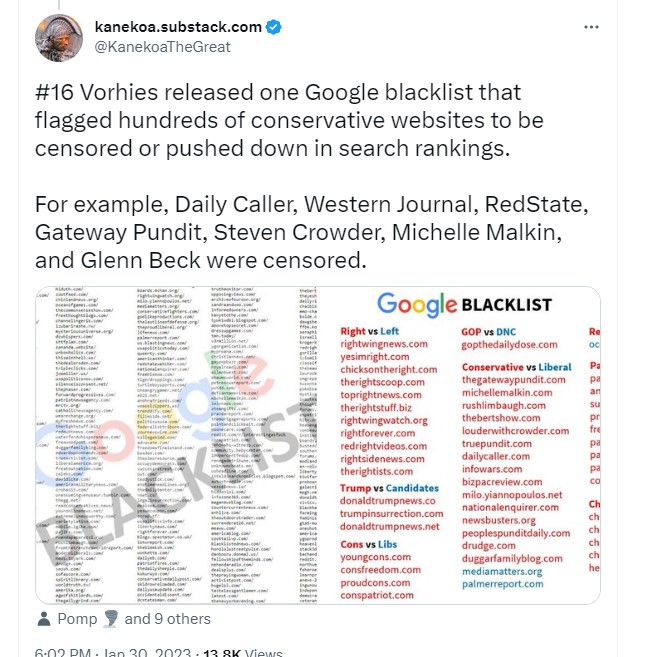Many surprising developments have surfaced after the release of Twitter Files. Among the leaks, the ones about the government and the FBI marking people on social media as potential threats stand out as particularly troubling. Twitter is only one example; other social media are also a target of the same worries.
Account user KanekoaTheGreat, whose bio reads, “Banned by Vijaya • Resurrected by Elon • Independent Citizen Journalist.” was reinstated by the wealthy businessman Elon Musk. Kanekoa issued a tweet on Monday with a link to a substack he had made in September, in which he claimed that “Google Rigged The 2020 Election.” In his tweet, Kanekoa brings several of its more fascinating aspects to light. Especially regarding Project Veritas which gained access to internal papers at Google detailing the alleged filtering and suppression of conservative material.

With billions of queries daily, Google is the clear frontrunner in the search engine market. YouTube, which Google owns, has over two billion users. So much of the day’s viewing is affected, and if they’re manipulating our views, that’s a significant issue. The article highlighted Google’s influence, noting that its nearly 5.6 billion daily searches accounted for around 90 percent of all internet searches, with YouTube coming in second with about 1 billion hours of daily video views.
According to Kanekoa, our thoughts, political ideas, and world views are inextricably tied to Google’s search results. Yet, Google is no longer an objective source of information, and the internet giant is deliberately suppressing what we see.
A software developer at Google, Zach Voorhies, released 950 pages of internal papers to the public and the Justice Department in 2019, alleging that they revealed blacklists and machine learning algorithms that banned conservatives and populists. In 2021, he published a book in which he made claims of political and censorial interference.
Further, he disclosed data from “fringe rank classifiers” that favor liberal media outlets over conservative ones like Fox News. In comparing “authoritative” and “trashy” news sources, Google found that ABC, CBS, and CNN were more authoritative than Fox News and Breitbart. Using this method, Big Tech inserted political bias into search results and algorithms by hand.
Who then has the authority to label certain reports as “false news” or to label other reports as “authoritative?” When did someone determine that CNN was more “official” than Fox? That’s the trouble with heading in this direction; it’s not nice.
However, Google representatives testified before Congress that neither blacklisting nor prejudice occurred at the company. In addition, there was an intimate relationship between some people, such as former Google chief and current Alphabet Chair Eric Schmidt, and the Clinton campaign. He is now contributing to the Biden administration by funding several positions.
In 2022, Republicans were incensed by research claiming that Gmail treated most Republican fundraising emails as junk while mostly ignoring Democratic ones.
Google’s spam filtering of 77% of Republican candidates’ fundraising emails since 2019 has cost them almost $2 billion, according to research. Regarding Democratic fundraising emails, Gmail flagged less than 11% as spam during that time.
Google said the result was due to tailoring to user preferences and denied any wrongdoing. In light of the Twitter Files, the follow-up question is: What will be done to correct this? How do we safeguard social media? As for all these concerns, will Congress be asking the right questions?
For more news: